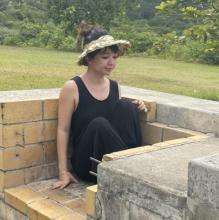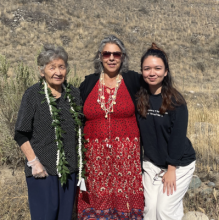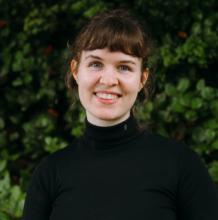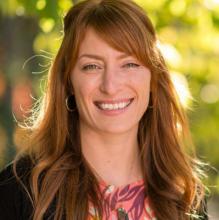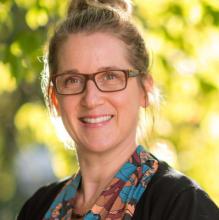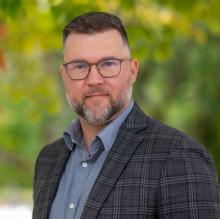Throughout history, we see that globally, the education sector has been used to marginalize people and suppress the usage of local languages. As a linguistics student, I think my academic work can be used to advocate for people, and languages of these communities, especially how they exist within the realm of education.
Research Description
My dissertation research considers the psycholinguistic connections between two languages spoken in Hawaiʻi: Pidgin and ʻŌlelo Hawaiʻi. ʻŌlelo Hawaiʻi is the indigenous language of Hawaiʻi and Pidgin is a creole language that emerged in Hawaiʻi post-colonialism, which contains linguistic components from languages including English, ʻŌlelo Hawaiʻi, Cantonese, Portuguese, Japanese, Tagalog, among others. Although Pidgin currently is a first language for the majority of the local population in Hawaiʻi, the use of Pidgin is stigmatized and is largely suppressed in public society, especially within the education sector.
There have been official attempts to ban Pidgin from being used in schools and it remains widespread practice to prevent and/or punish the use of Pidgin in the classroom. Employers also have legal precedent to prevent employment based on Pidgin-accentedness (Kahakua et al. v. Hallgren 1987) which remains current and unchallenged to this day. Simultaneously, there are limitations to domains in which ʻŌlelo Hawaiʻi can be spoken and understood in modern Hawaiian society. Following the illegal annexation of the Hawaiian Kingdom by the United States, ʻŌlelo Hawaiʻi was banned on school grounds and English was established as the exclusive medium of instruction, despite ʻŌlelo Hawaiʻi being spoken by the majority population at the time. It was common for young students to be physically punished when caught speaking ʻŌlelo Hawaiʻi at school. There has since been profound progress led by Kānaka Maoli (Indigenous Hawaiians) towards ʻŌlelo Hawaiʻi revitalization, however, these efforts are confronted by considerable obstacles, largely due to hegemonic systems of power which propagate English monolingualism as the societal norm and colonial attitudes which identify languages like ʻŌlelo Hawaiʻi as holding lesser capital value. The stigmatization of Pidgin and ʻŌlelo Hawaiʻi poses a significant burden on the community, particularly for Kānaka Maoli. The suppression of the mother tongue in instruction is identified as a root cause of emotional distress among students and significantly impedes learning; research in indigenous communities reports worse physical and mental health outcomes for individuals who do not speak their heritage languages. In the face of these challenges, ʻŌlelo Hawaiʻi teachers have increasingly been adopting the practice of using Pidgin as a medium of instruction as opposed to English, often citing the cultural and linguistic connections between the two languages.
My dissertation investigates the research question: is the use of Pidgin as a medium of instruction for teaching ʻŌlelo Hawaiʻi as a second language associated with processing and/or learning benefits for students? I hypothesize that Pidgin, as opposed to English, will facilitate the processing and acquisition of ʻŌlelo Hawaiʻi and thus can be leveraged in the ʻŌlelo Hawaiʻi classroom experience. I investigate this research question using methodologies and paradigms from the toolkits of complementary disciplines, including experimental psycholinguistics, comparative linguistics, second language acquisition, and language education. There is interdisciplinary support for the current hypothesis. As ʻŌlelo Hawaiʻi is the primary substrate language of Pidgin, the two languages are linguistically linked along several structural dimensions, including at the syntactic level, the word level, the sound level, and the suprasegmental level. ʻŌlelo Hawaiʻi and Pidgin are also socially linked and contextually co-occur, as both are often used in contexts of resistance against threats of American assimilation.
Prior work in psycholinguistics finds that languages that are linguistically related and/or are socially associated facilitate speech processing when code-switching between the two languages. Furthermore, several models of language perception predict that speech that is socially or contextually linked is more likely to be cognitively associated as they share a greater likelihood to co-occur based on a given listener’s prior experience. Second language acquisition theory also suggests that a second language is easier to learn when it shares common linguistic attributes with a first language. It is theorized that the statistical regularities in the two languages would be similar enough to allow the learner to bootstrap their knowledge of one language to facilitate the learning of the other. Finally, educational research demonstrates that the use of the mother tongue as the medium of instruction benefits students in several ways. Students are more motivated to succeed and participate more and are less likely to drop out when the mother tongue is used in educational settings. Parents of students are also more likely to be involved in their child’s learning when they can understand the language of instruction. Overall, this research explores to what extent a learner of ʻŌlelo Hawaiʻi may benefit from the use of Pidgin as a medium of instruction and investigates this question using interdisciplinary theory and methodologies.
What does being a Public Scholar mean to you?
Being born and raised in Hawaiʻi, I strongly resonate with work that operates under the framework of aloha ʻāina (aloha: ‘love’; ʻāina: ‘land’, lit: ʻthat which nourishes’). Central to Hawaiian epistemology, aloha ʻāina is a perspective which captures, in essence, that a vital part of receiving is giving back. This reciprocal relationship encompasses not just human-to-human interactions but also our relationship to the land, to language, and to knowledge systems, all seen as living entities that need to be cared for to sustain life. I was raised on Hawaiian land, surrounded by Pidgin and ʻŌlelo Hawaiʻi in-home and in-community, educated in Hawaiʻi public schools, and am now engaging in research that requires interaction with Hawaiian knowledge systems and in-community support back home. Under this framework, it is my kuleana (‘responsibility’) as a Public Scholar to produce research that supports the improvement of Hawaiʻi as a whole, including the land, language, the public education system, and our local community. I will do so by: i) supporting the ʻŌlelo Hawaiʻi revitalization movement; ii) promoting the value of Pidgin and ʻŌlelo Hawaiʻi in various domains, and iii) raising into the collective consciousness issues surrounding language stigma and language-based inequalities. As a scholar now living and receiving an education in British Columbia, I will extend my kuleana to local communities through language work with the Secwepemc community and by analyzing the implications of the current research question towards the First Nations context
In what ways do you think the PhD experience can be re-imagined with the Public Scholars Initiative?
One major way I think the PhD experience can be re-imagined with the Public Scholars Initiative deals with the collaborative reframing of standard research practices. In the PhD experience, it is the status quo to carry a commitment to traditional research practices that may often be extractive to marginalized communities. The Public Scholars Initiative offers us a platform for discussing the ways we can conduct work that is anti-colonial across various disciplines, including a disassociation from academe-centric, extractive practices and a reexamination of ways we may ethically engage in-community. Second, I think the nature of public outreach emphasized in the Public Scholars Initiative provides the potential for the re-framing of “expertise” in the PhD experience. In our orientation towards the community, we establish the larger community and social partners as experts to learn from. This expands our learning and the potential impact of our research beyond the scope of the classroom experience.
How do you envision connecting your PhD work with broader career possibilities?
I’d like my work after completing my PhD to involve serving the public. I envision this service in a number of different ways, whether this be in research, education, language technology, or in policy.
How does your research engage with the larger community and social partners?
In executing my research, I will engage with community-based organizations, educational institutions, and local media. I will publicize this work outside of Hawaiʻi to promote attention on Hawaiian rights. Thus far, this work-in-progress has been promoted locally (e.g. da Pidgin Coup), in British Columbia (e.g. the Green College Members Series), and more broadly (e.g. the Field Notes Podcast). I have established collaborations with local instructors of ‘Ōlelo Hawaiʻi, professionals involved in ‘Ōlelo Hawaiʻi language curriculum development, organizers involved in Pidgin advocacy, and ‘Ōlelo Hawaiʻi students, to carry out this research.
Why did you decide to pursue a graduate degree?
I chose to pursue a PhD in Linguistics because I felt it would increase my chances of being able to turn language work into a career. I also wanted to gain the knowledge and training to better serve my community, particularly regarding perpetuating linguistic activism for our local languages. Lastly, I come from a Pidgin-dominant family that had very few educational opportunities so the prospect of carrying our family name into academic spaces they were long excluded has felt meaningful to me. Members from marginalized language communities tend to not be well represented in PhD programs and there are many reasons for this. This is something I would like to help change in the future.
Why did you choose to come to British Columbia and study at UBC?
I read a paper a few years prior that was co-authored by my current supervisor Dr. Molly Babel which helped me imagine the research question of my current PhD project. Upon doing more research on UBC, it became clear that UBC was an ideal choice for me. The graduate students were doing a broad range of really exciting, important work. There are several other faculty whose work I found inspirational at UBC Linguistics including Dr. Kathleen Currie Hall, Dr. Bryan Gick, Dr. Carla Hudson Kam, and Dr. Márton Sóskuthy. I was also attracted to work done within the British Columbia First Nations context with an expert in the field, Dr. Henry Davis. British Columbia and Hawaiʻi have always had a special connection via the Pacific Ocean. The two places are even connected linguistically, as some of the first Pidgin words emerged from the fur trade connecting BC and Hawaiʻi and thus, Pidgin shares common words with Chinook. Some ‘Ōlelo Hawaiʻi words such as “Kanaka” (lit: ʻperson’) have made their place in British Columbia, as a place name in interior British Columbia, as well as the theorized source of the word “Canuck”. Language work is such an international issue, so to me, the idea of exchanging ideas on language activism with international collaborators, colleagues and mentors seemed like a good learning opportunity.
The nature of public outreach emphasized in the Public Scholars Initiative provides the potential of the re-framing of “expertise” in the PhD experience.


